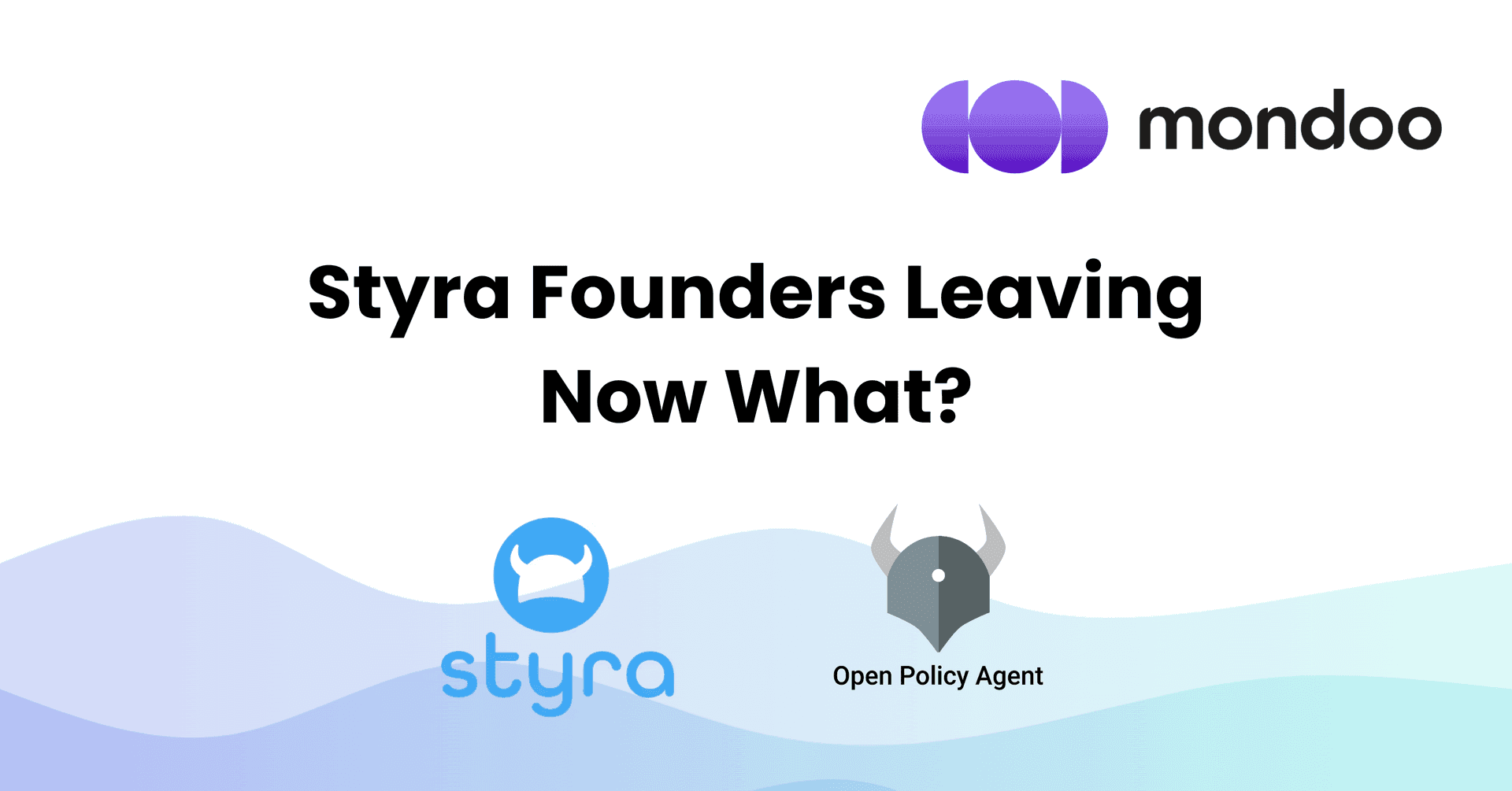At the heart of this discussion are two Styra open-source projects that are tightly linked together: The Open Policy Agent (OPA), an engine for executing policies, and Rego, a declarative language for writing policies. These projects are well-known in the Kubernetes community and offer policy executions for other use-cases as well.
What is Styra OPA?
Styra OPA is an open-source policy engine that enables fine-grained control and authorization across various systems using a declarative policy language called Rego. OPA is used for:
- Application authorization: OPA allows developers to define authorization policies in a declarative way, which simplifies development, improves maintainability, and enhances security by centralizing policy management. For example OPA can be used to determine whether a user is authorized to view a specific document based on their role and the document's attributes.
- Infrastructure guardrails: OPA enforces configuration policies on infrastructure deployments like Kubernetes, microservices, and CI/CD pipelines, ensuring that resources are provisioned according to predefined rules and best practices. For example, OPA can be used to ensure that all Kubernetes deployments are deployed to approved regions, require specific security settings, or use approved container images.
From the ground up, the OPA/Rego framework was designed to solve a very specific problem: Authorization. This area is one of the most daunting fields for developers to maintain and is riddled with complexities. OPA offered a better solution that helped many developers (including ourselves) tackle authorization use cases in a maintainable way. It is great for programmers that have to deal with authorization use cases, especially in APIs and Kubernetes scenarios.
Today, there are many paths for tackling authorization use cases. For an alternative approach to authorization, you can take a look at OpenFGA, which is based on the paper "Zanzibar: Google’s Consistent, Global Authorization System." There is also AWS Cedar and Google Zanzibar itself.
New frontier: OPA for infrastructure security and compliance
Over the years, the coverage of OPA and Rego gradually expanded to new use cases, such as conftest. These were more focused on infrastructure components, like writing policies to verify IaC code (e.g. Terraform), filtering alerts in CI/CD pipelines, and validating compliance requirements before these configurations are applied to production.
As OPA usage continued expanding, new users like security analysts started using it and new requirements were also introduced. However, these new users were getting frustrated with the framework, because it was complicated, hard to debug, and difficult to expand. OPA/Rego was now being used by an entirely new group of users, who weren't developers anymore. Even with the rise of GenAI, which made it easier to generate Rego code, these problems persisted and became worse as users struggled to maintain and test their policies.
Maslow's hammer is very fitting here: "If all you have is a hammer, it's tempting to treat everything like a nail." OPA and Rego were trying to solve problems that they weren't designed to solve well. That's why we encountered many teams in some of the largest tech companies in the world who tried and failed to implement OPA/Rego for infrastructure security and compliance.
Mondoo Policy as Code
Mondoo offers an intuitive approach centered on YAML policies and lightweight Mondoo Query Language (MQL) scripts to enforce policies across the entire IT environment (including cloud, on-prem, endpoints, and SaaS). MQL can be used to create policies in cnspec, Mondoo’s open source, cloud-native tool that assesses the security, compliance, and cost control of your entire infrastructure. MQL was purpose-built for security teams, making it the easiest policy as code solution to use and understand.
Mondoo includes a rich library of pre-built policies for common security standards and compliance frameworks, and makes it easy to write YAML policies in MQL, even for non-developers. In addition, Mondoo includes an AI policy generator, pre-trained on Mondoo MQL policies, that can generate or update policies. All coded policies can be viewed in the Mondoo UI, making them accessible for security and compliance teams.
Due to this design, Mondoo is far better suited than OPA/Rego to tackle infrastructure security and compliance that is used by both security and platform engineering teams.
Mondoo Policy as Code is perfect for:
- Security posture analysis of cloud environments: with built-in support for AWS, Azure, Google Cloud, OCI, and more.
- Security posture of operating systems and containers: covering the vast majority of OSs for servers and endpoints, images, as well as containers and container images.
- Infrastructure as Code (IaC): including Terraform, Ansible, and CloudFormation. Policies can even be written for IaC and runtime use cases at the same time. For example, a rule can check if your Terraform HCL is configured correctly, while also testing the deployed service in your cloud.
- Kubernetes: including manifest security and Kubernetes objects. The Mondoo Operator for Kubernetes supports analyzing entire clusters.
- Cost controls: to avoid costly infrastructure from spinning up without guardrails. Cost control policies can prevent unnecessary spend and help manage exceptions.
- Best practices: policies that focus on operational requirements and best practices that you want your platform teams to follow.
- Compliance: particularly for regulatory compliance across different countries. These compliance frameworks help automate the evidence gathering and prevent changes from breaking compliance policies.
- Inventory: MQL was not only written with policy assertions in mind, but was also built on the premise of creating a rich inventory of your infrastructure. You can use the inventory to explore, search, or feed it into your favorite AI tool to quickly get accurate answers about which assets you have, and what’s running on them.
While switching to a different solution always takes some effort, we believe that for those who are using OPA/Rego for infrastructure security and compliance the additional effort is worth it - especially now, with the uncertain future of OPA.
Comparing Mondoo MQL with OPA Rego
Below we provide a few comparisons between Mondoo's MQL and OPA's Rego. The examples for Rego are taken from the conftest examples. In these examples you can see how much shorter and more concise the MQL code is. It is considerably easier to read, understand, and to maintain long-term.
#1. Dockerfile
DockerfileFROM openjdk:8-jdk-alpineVOLUME /tmpARG DEPENDENCY=target/dependencyCOPY ${DEPENDENCY}/BOOT-INF/lib /app/libCOPY ${DEPENDENCY}/META-INF /app/META-INFCOPY ${DEPENDENCY}/BOOT-INF/classes /appRUN apk add --no-cache python3 python3-dev build-base && pip3 install awscli==1.18.1ENTRYPOINT ["java","-cp","app:app/lib/*","hello.Application"]
Example: Ensure the openjdk image is not used
Rego:
Regopackage mainimport rego.v1denylist := ["openjdk"]deny contains msg if {some iinput[i].Cmd == "from"val := input[i].Valuecontains(val[i], denylist[_])msg = sprintf("unallowed image found %s", [val])}
MQL:
MQLdocker.file.stages.none(from.image == "openjdk")
Example: Ensure that apk, apt, pip, curl, wget commands are not used
Rego:
Regopackage commandsimport rego.v1denylist := ["apk","apt","pip","curl","wget",]deny contains msg if {some iinput[i].Cmd == "run"val := input[i].Valuecontains(val[_], denylist[_])msg := sprintf("unallowed commands found %s", [val])}
MQL:
MQLdenylist = ["apk", "apt","pip", "curl", "wget"]docker.file.stages.all(run.all(script.split(" ").containsNone(denylist)))
#2. Terraform/HCL
Example: Ensure that google_iam and google_container resources are not used
Full example is available in the gke.tf file on GitHub.
HCLprovider "google" {version = "2.5.0"project = "instrumenta"region = "europe-west2"}resource "google_container_cluster" "primary" {name = "my-gke-cluster"location = "us-central1"..}resource "google_container_node_pool" "primary_preemptible_nodes" {name = "my-node-pool"...}
Rego:
Regopackage mainimport rego.v1denylist := ["google_iam","google_container",]deny contains msg if {check_resources(input.resource_changes, denylist)banned := concat(", ", denylist)msg := sprintf("Terraform plan will change prohibited resources in the following namespaces: %v", [banned])}# Checks whether the plan will cause resources with certain prefixes to changecheck_resources(resources, disallowed_prefixes) if {startswith(resources[_].type, disallowed_prefixes[_])}
MQL:
MQLdenyList=["google_iam", "google_container"]denyList.all(entry: terraform.resources.none(nameLabel.contains(entry)))
#3. Kubernetes
Example: Kubernetes Deployment file
YAMLapiVersion: apps/v1kind: Deploymentmetadata:name: hello-kuberneteslabels:app.kubernetes.io/name: mysqlapp.kubernetes.io/version: '5.7.21'app.kubernetes.io/component: databaseapp.kubernetes.io/part-of: wordpressapp.kubernetes.io/managed-by: helmspec:replicas: 3selector:matchLabels:app: hello-kubernetestemplate:metadata:labels:app: hello-kubernetesspec:containers:- name: hello-kubernetesimage: paulbouwer/hello-kubernetes:1.5ports:- containerPort: 8080
Rego:
Regopackage kubernetesimport rego.v1is_deployment if {input.kind = "Deployment"}package mainimport rego.v1import data.kubernetesname := input.metadata.namedeny contains msg if {kubernetes.is_deploymentnot input.spec.template.spec.securityContext.runAsNonRootmsg = sprintf("Containers must not run as root in Deployment %s", [name])}
MQL:
MQLk8s.deployments.all( podSpec.securityContext.runAsNonRoot == empty)
Deciding between OPA and Mondoo MQL
So how do you decide which solution is best for your purposes? Below we have listed the pros and cons of both solutions as well as a decision matrix, to help you make the best decision.
Pros and Cons of OPA Rego
| Pro | Con |
|---|---|
| Data agnostic - Works with any JSON/YAML data from any source | Steep learning curve - Logic programming paradigm is unfamiliar to most |
| Real-time enforcement - Perfect for admission controllers | Requires external data collection - Need separate systems to gather config data |
| Mature ecosystem - Extensive tooling, IDE support | Generic data model - No built-in understanding of specific resource types |
| Kubernetes native - Deep integration with K8s via Gatekeeper | Limited security expertise - Requires building security knowledge from scratch |
| Rich query language - Supports complex joins, aggregations, set operations | No built-in risk scoring - Manual effort to implement impact assessment |
| Verbose syntax - Can become complex for simple checks | |
| Debugging challenges - Logic programming can be hard to troubleshoot | |
| No asset management - Lacks inventory and tracking capabilities |
Pros and Cons of Mondoo MQL
| Pro | Con |
|---|---|
| Security-focused design - Built specifically for security and compliance | Limited real-time enforcement - Primarily assessment-focused |
| Easy to learn - GraphQL-like syntax familiar to most security users | Provider dependency - Limited to supported platforms and services, providers are extensible similar to terraform. |
| Automated data collection - Built-in scanners for 25+ platforms | Less general-purpose - Not suitable for non-security policy use cases like authorization |
| Rich resource models - Deep understanding of AWS, Azure, K8s, OS configs | Emerging ecosystem - Fewer third-party integrations and community tools |
| Pre-built policies - Extensive library of CIS, SOC 2, PCI DSS policies | |
| Risk scoring built-in - Automatic impact assessment | |
| Asset inventory - Comprehensive tracking and management | |
| Unified platform - Single tool for cloud, OS, containers, SaaS | |
| Professional support - Commercial backing with enterprise features | |
| Compliance reporting - Rich dashboards and audit reports |
OPA vs Mondoo Decision Matrix
| Choose OPA/Rego if you need | Choose Mondoo if you need |
|---|---|
| Real-time authorization enforcement | Security & compliance assessment |
| Kubernetes admission control | Out-of-the-box security policies like CIS, STIG, and Mondoo benchmarks |
| Custom authorization logic | Enforce custom business requirements like cost controls, security, and compliance |
| Multi-cloud configuration scanning incl. coverage of IaC to cloud policy coverage | |
| IaC and runtime assessment for tool consolidation | |
| Comprehensive vulnerability detection and remediation | |
| Risk-based prioritization to prioritize business-critical systems and toxic combinations | |
| Asset inventory | |
| Professional support |
Conclusion
Mondoo Policy as Code is focused on providing ease of use and provides a more comprehensive, unified solution for policy as code, particularly catering to security and compliance needs across the entire IT infrastructure, including traditional and modern components.
Mondoo's MQL framework supports countless use cases out of the box, is easier to succeed, and works well in combination with LLMs. Mondoo’s open-source projects are also highly extensible to support any technology you want to tackle. Take it for a spin and join our community! Or, if you’d like to discuss your Policy as Code needs, please contact us.


